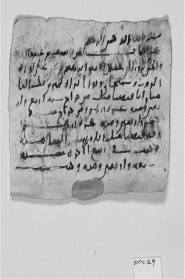
ERC Consolidator Grant for Petra Sijpesteijn
Arabist and papyrologist Petra Sijpesteijn has received a Consolidator Grant from the European Research Council for her research on the early Islamic Empire. The five-year ERC grant will fund the research project "Embedding Conquest: Naturalising Muslim Rule in the Early Islamic Empire (600-1000)."
Following the death of Mohammed in 632 C.E., the early Islamic Empire existed for almost 300 years, and for many Muslims it still exists today. However, the Arabs apparently had little understanding of organisational matters, and no imperial tradition to speak of. How did they manage to gain dominance of an ethnically, religiously and linguistically diverse area spanning from the Atlantic seaboard to the Indus? What built the empire, and what held it together? These will be the guiding questions for Sijpesteijn and her research team in the years to come.
Available sources
Scholarship to date has overwhelmingly relied on “literary” – i.e. formal – sources in Arabic (e.g. chronicles, legal treatises, theological tracts) composed centuries after the seventh-century Arab conquests and shaped by court politics at their time of writing.
“Documentary” — i.e. informal – sources in multiple languages on papyrus, leather and paper from all over the empire are becoming increasingly available, with Sijpesteijn in an internationally leading role. These sources, including letters, contracts, petitions and work permits, offer a direct and contemporary view on how the empire worked on the ground.
Sijpesteijn’s research project will uniquely incorporate all available documents reflecting Muslim rule from the first 400 years of Islam. It will reconstruct the system of social relations that enabled the transition from a conquest society to a political unity that survived the breakdown of central caliphal control in the mid-tenth century, and still remains the region’s model until today.

An inclusive Muslim Empire
Literary sources have created a false impression of Muslim rule as a centralised top-down process built on military coercion and control through administrative systems. Documentary sources, however, uncover a system of social relations that enabled the transition from an ethnically Arab into an inclusive Muslim empire, where social cohesion brought different groups into the fold of the empire and supported it for the centuries to come. By taking an innovative bottom-up approach, Sijpesteijn and her team will focus on how the active engagement of subject populations contributed to the creation of social cohesion.
Relevance
Sijpesteijn’s project will critically advance our understanding of a world historical event, and will make a radically new contribution to empire studies. It is also relevant for today’s world as it will show that an Islamic Empire can indeed be inclusive towards non-Muslim people. The project will start in the spring of 2017.
